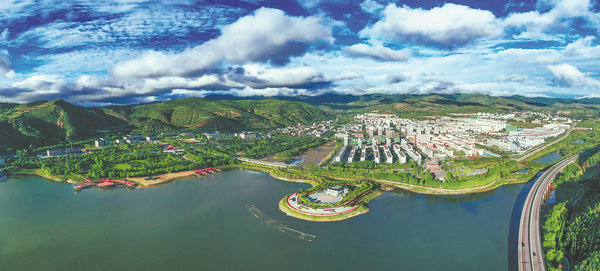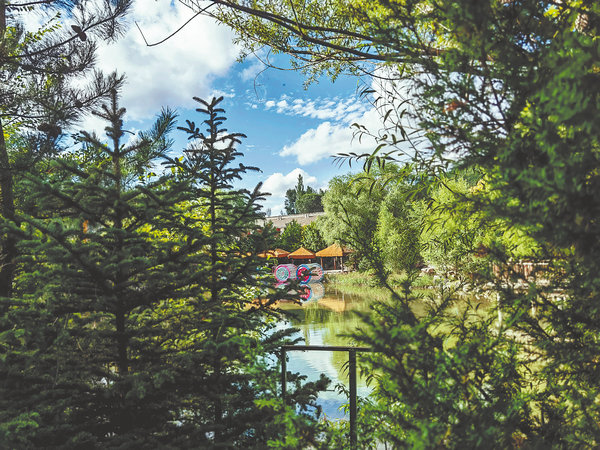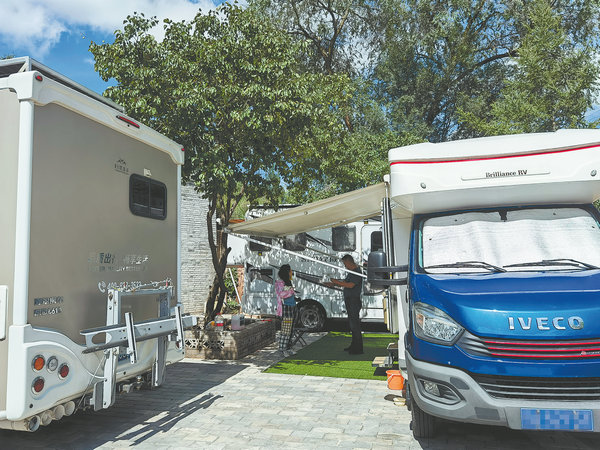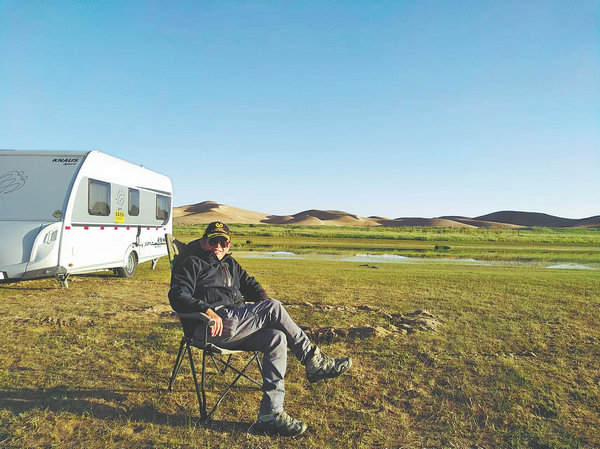Yang Hongming, a 72-year-old retired teacher from Chengdu, Sichuan province, has made the Recreational Vehicle campsite in Xinhe village in Longde county of the Ningxia Hui autonomous region in Northwest China his home in recent summers.
"Sichuan is a great place, but I am so content living here that I don't want to go back," beamed Yang as he stood in front of his RV at the campsite in August.

Aerial view of Longde county in summer. [Photo provided to China Daily]
Longde county is located in the southern part of Guyuan city, on the northwest side of the main peak of the Liupan Mountains. With elevations ranging from 1,720 meters to 2,942 meters, it boasts unique geographical elements. The forest area rate is 33.94 percent and the comprehensive vegetation coverage of grasslands is 86.6 percent.
The area enjoys a suitable humidity level, pleasant winds and a mild climate throughout the year, with a comfortable climate period lasting seven months. It was awarded the title of "China's Natural Oxygen Bar "in 2023 by the China Meteorological Administration. During the hottest months, it boasts 100 days of the most comfortable climate, making it an ideal summer retreat in China.

A street corner in Longde county in August. [Photo by WU YANBO/China Daily]
Cooler summers
Since retiring, Yang and his wife have traveled around the country by RV. In past summers, they had driven to Longmenshan town in Pengzhou city near Chengdu to escape the heat, but while the area was cooler, there were many rainy days, leaving them feeling consistently damp.
"Longde has many sunny days in the summer, it's not humid, the air is good, and the temperature is perfect — around 22 C. Last summer, I drove the RV to stay in Xinhe village for nearly three months. This year, I plan to stay longer as I suffer from asthma, but I feel much better here."
In July, Yang and his wife parked their RV in a campsite with pavilions named after the country's 56 ethnic groups. Their neighbors come from across China, including Ningxia, Jiangsu, Guangdong and Fujian provinces. The oldest camper is 83 from Jiaozuo city of Henan province who was driven by her son.
Yang says: "Xinhe village is picturesque. The RV campsite has water, electricity and charging stations. The surroundings are flat and, if it rains, it doesn't get muddy. There are bathrooms and a shared kitchen and the village also built a fish pond. There is a bus that can take us to town and the county seat for shopping, so we are happy living here."
Xinhe village is located 8 kilometers from Longde county, with an average elevation of 2,650 meters, with the Yuejiaxia Forest Park and a small river flowing from east to west across the village.
Zhao Xiaolong, the Xinhe village Party secretary responsible for the RV campsite, says that since 2015, the village has aimed to develop characteristic rural tourism, improving the living environment by constructing sewage treatment systems, parking lots, and more.
Establishing a national-level intangible cultural heritage base for "Gaotai Ma Shehuo" (performing on stilts and horses with ancient Chinese cosplay) and developing projects such as eco-tourism, farmhouse stays and water parks, the village was selected in the first batch of national key rural tourism villages in 2019. In 2023, the Yuejiaxia Forest Health Base was designated as a national pilot forest health construction site.
"In the past, we aimed to attract more tourists during traditional holidays like Spring Festival through traditional shehuo performances, but the efforts were limited. In August 2019, experienced RV traveler Zha Haiyong came to our village and noticed the natural environment and well-leveled parking lots but few tourists," Zhao says.
Zha suggested and guided the village to establish the RV campsite to attract more self-driving and RV tourists. Currently, the village's RV campsite covers nearly 40,000 square meters with the capacity to serve over 300 RVs at the same time.

The Recreational Vehicle campsite in Xinhe village, Longde county, Guyuan city in Ningxia Hui autonomous region. [Photo by WU YANBO/China Daily]
Seeking respite
Zha, 68, is the former deputy director of the rural science and technology development center of the science and technology department of Ningxia and serves as a volunteer adviser for the Xinhe village RV campsite.
After retiring, he and his wife began traveling around in their RV.He says: "The world is so vast, we want to see more of it." During the spring and autumn, they stay in places like Jiangsu, Zhejiang, and Sichuan provinces, living the RV life. In winter, they head to Yunnan and Hainan provinces.
"One summer before retiring, I visited Mohe city in Heilongjiang province, the northernmost part of China. It was a great place to escape the heat and see blue skies with white clouds and vast expanses. But it is far from Ningxia. In the following years, I sought respite from the heat in different places but wasn't successful."
In August 2019, Zha and his friends traveled by RV to Longde county. Following the locals' recommendations, they arrived in Xinhe. In his travel blog, he described it as "a misty, small mountain village, dreamlike and enchanting, with a unique charm. In the past, one could only experience such feelings through movie scenes or novel descriptions. Now, Xinhe has stepped to the forefront of new rural construction".
"The village had relatively well-developed tourism infrastructure. Along the tourist routes where campsites could be established was access to water and electricity and the roads were in good condition, requiring only minor modifications for parking areas."
After the layout for the first phase of RV campsites was finalized, Zhao led the villagers to build the RV campsite in the winter of 2019 and, by the following spring, it was ready for use.
Zha says: "The villagers are hospitable and Zhao is very efficient and eager to develop the village. Many members of our RV team also volunteered to help with the construction and operation of the RV campsites".
Li Zhifeng, a friend of Zha who worked in environmental planning and design, assisted in the specific designs of the RV campsite, including the color and orientation of the pavilions, ensuring they harmonized with the style of the existing ancient architecture.
Another RV camper, Huang Yunzhong, who works in hotel management, provided training for local villagers on accommodation services processes, encouraging them to open farm stays to increase their income.
"Chen Jianzhen, the Party secretary of Chenjin town, strongly supports the village's RV campsite construction and granted us the title of 'Honorary Villagers'. Living here truly feels like home", Zha says.
To date, the RV campsite has attracted over 20,000 tourists and involved 79 local households in rural tourism. It has also spurred the development of nearby campsites like Qingliang Village RV Campsite and Gaoyang Huagu RV Campsite. It also attracted neighboring towns to learn from Xinhe village's experience.
Currently, the daily rental fee for the Xinhe campsite is 40 yuan ($5.5), the electricity fee is 0.75 yuan per kilowatt-hour, and the monthly rent is 720 yuan. During the off-season, the daily rental fee is 20 yuan. In 2022, the village experimentally constructed four cave campsites with independent bathrooms, kitchens and heated floor systems, each covering 64 square meters, available for a five-year lease at 5,000 yuan per year.

Zha Haiyong travels to the Qinghai Lake via his RV in 2017. [Photo provided to China Daily]
Integrated facilities
From June 2022 to September 2023, Zha and his wife stayed in one of the cave campsites for 16 months and spent Spring Festival there. "It's warm in the winter, too. We experienced over 20 heavy snowfalls in the mountain village and it was cozy to sit in the cave eating hot pot and watching the snow. This year, we decided to lease the cave campsite for five more years."
Zhao says, starting this year, the site is offering relatively independent RV campsites for five years, 250 sq m for 2,000 yuan per year or 350 sq m for 3,000 yuan, allowing guests to build their own "summer courtyard". Currently, 15 independent campsites are leased and four more have been built.
In 2017, over 70 households in Xinhe village were mobilized to invest in and establish a tourism company. In addition to the government's investment of over 10 million yuan, the tourism company also invested over 10 million yuan.
Zhao says: "Developing rural tourism requires high investment but has slow returns, even though the campsite is almost fully booked in the summer. In the future, an additional investment of about 20 million yuan is needed to build facilities like eco-restaurants along the mountain roads to meet the dining and accommodation requirements of tourists."
Zha believes that the RV campsite has already played a role in attracting more tourists. Located between the major cities of Xi'an in Shaanxi province, Lanzhou in Gansu province, and Yinchuan in Ningxia, the area benefits from convenient transportation. These large cities have a significant market demand from retired individuals seeking summer retreats. The unique climate and natural conditions provide substantial space for development and market potential in summer leisure tourism.
From Zha's perspective, to seize the opportunity for summer leisure tourism, it must attract more visitors by building summer apartments and encouraging more locals to open homestays.
RV tourism, on the other hand, is increasingly favored, and its market is gradually expanding. The standardized and scaled construction of RV campsites requires attention from local governments interested in developing integrated tourism. RV campsite construction in provinces such as Hainan, Yunnan, Sichuan, and Zhejiang is relatively mature.
"In 2017, when we traveled by RV to Xishuangbanna in Yunnan province, we couldn't find campsites and were forced to stay in parking lots, which was awkward and chaotic. Now, the local government not only emphasizes RV campsite construction but also strictly regulates RV parking and campsite management. The northwest region is just starting in this regard." Zha says.
Yang says: "The unique natural geographical environment and climate of Longde cannot be replicated. I hope the local government will develop this area into a summer resort that more people from the south will visit."
The Liupan Mountains were the last mountains crossed by the Red Army during the Long March (1934-36), so the area is rich in Red (revolutionary themes) Tourism resources. Guyuan city is an important international city on the ancient Silk Road, with a rich historical and cultural heritage.
Zhang Shuai, of the business development department of the China Tourism Association, states that the construction of RV summer campsites in the Liupan Mountains area can not only fully utilize its unique climate advantages to develop high-end summer leisure tourism, improve the living environment and increase incomes for the residents in the old revolutionary base, but also attract more tourists to explore its diverse cultural and tourism resources.
Guyuan has the potential to be comparable to Hainan's island-wide RV campsites, Zhang adds.